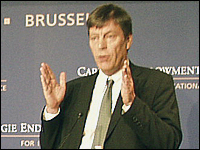Registration
You will receive an email confirming your registration.
IMGXYZ872IMGZYX On March 18, 2008, the Carnegie Endowment hosted Peter Thompson, Director for Trade and Development of the European Commission, for a discussion on the recently signed economic partnership agreements (EPAs) between the European Union and African, Caribbean, and Pacific (ACP) countries. These comprehensive trade agreements call for developing countries to eliminate tariffs on 80% of imports from the EU in exchange for receiving full duty-free quota-free access to the European market. The EPAs are designed to replace a previous unilateral trade preference system under which ACP countries were granted free access to the EU market, which expired at the end of 2007.
The EPA negotiations have provoked controversy, with the EU maintaining that EPAs will spur development in the ACP countries by strengthening regional integration and stimulating investment while critics contend that Europe is attempting to force open African markets. Of the 79 ACP countries, to date 35 have signed EPAs, with an additional 32 continuing to enjoy duty-free quota-free access to the European market through the EU’s Everything-but-Arms program for least developed countries. It remains to be seen whether EPAs will succeed in promoting long-term sustainable development or if the agreements will simply divert the trade of ACP countries toward Europe without creating new opportunities for growth, as critics have argued.
Mr. Thompson opened his remarks by underlining the faults in the previous preference agreements governing EU-ACP trade. He noted that the prior system of unilateral preferences did not comply with WTO regulations, as non-ACP countries at similar levels of development were not offered the same benefits. The system was thus unsustainable, and open to challenge in the WTO by other developing countries such as Ecuador and Colombia. In addition, he said, the previous agreements had failed to produce widespread benefits for ACP countries: most had not succeeded in diversifying their economies, nor had they significantly increased their exports. There was thus a clear need to find a new solution, he continued, one which would both advance development in ACP countries and be acceptable to the EU’s other trading partners in the WTO.
Mr. Thompson highlighted the example of the EPA recently reached with the Caribbean region, which includes not only the liberalization of trade in goods but also agreements on topics such as services trade, investment, rules of origin, intellectual property rights, and development aid. Turning to the situation in Africa, Mr. Thompson admitted that these negotiations have been more difficult: though some countries have endorsed the agreements, others have not. Faced with these circumstances, the EU signed partial interim agreements with individual countries rather than entire regions, but remains optimistic that these deals will eventually evolve into region-wide agreements. In concluding, Mr. Thompson stated that the EU continues to want to further African regional integration, but must proceed at a pace acceptable to African governments. He also noted that, should WTO members fail to reach an agreement in the Doha Round in the near future, EPAs will play an even more instrumental role in stimulating development through trade.
In the lively discussion that followed Mr. Thompson’s address, David Laborde, of the International Food Policy Research Institute, asked Mr. Thompson to clarify the connection between aid money to be distributed to ACP countries through the European Development Fund and the EPAs. Mr. Thompson replied that €22 billion in aid money will be allocated amongst ACP countries over the next five years, which represents a significant increase over past European development assistance spending. While this money is aimed at addressing the needs of ACP countries following the expiration of the prior preference regime, specific decisions on spending have not yet been made.
Sudha Meiyappan of Manchester Trade asked what would happen if the interim agreements signed with Sub-Saharan African countries did not lead to full regional EPAs. Mr. Thompson responded that the EU was committed to transforming the partial interim deals already signed into broader region-wide agreements. While Central and Western African countries have been generally receptive to these proposals, he said, in Southern Africa the countries appear divided amongst themselves on the best path forward. There is no plan in place if it is ultimately decided a region-wide deal is impossible, he said, however EU negotiators are working to ensure the current partial agreements are not the final outcome.
In response to other questions, Mr. Thompson stated that the agreement with the Caribbean economies had not yet been formally ratified by the respective governments, but that he had no reason to believe this process would present any problems; that, of the countries that had not signed EPAs, only Nigeria, Congo-Brazzaville, and Gabon face potential trade disruption due to increasing tariffs; and that the primary objective of EPAs was integrating ACP countries into world markets, as the EU’s interest in the agreements was developmental rather than commercial.
